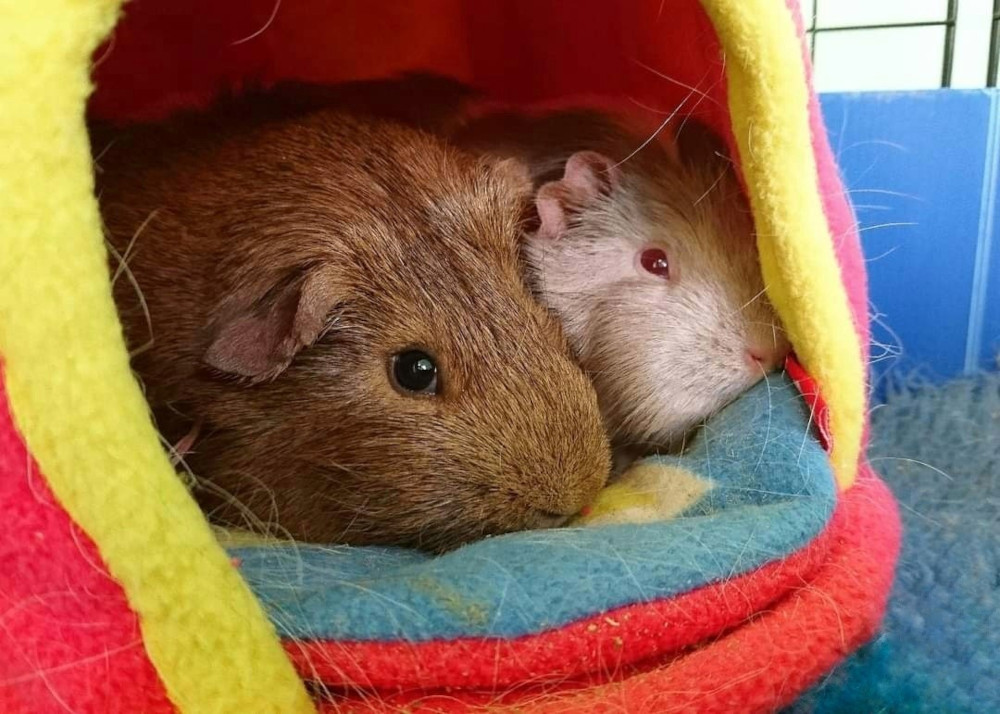
What is heat stress?
When any animal is subjected to excessive environmental heat, their body responds in ways to eliminate excess heat in the body (e.g., panting, sweating, moving into shade). If the animal If the animal cannot bring its body temperature down, heat stress develops, which can then progress on to heat exhaustion, heat stroke, and death.
What causes heat stress?
Guinea pigs are comfortable only in the narrow temperature range from 18°C to 23°C. They also prefer a low relative humidity (below 50%). Guinea pigs have no sweat glands, so heat regulation by means of sweating is not possible for them. This puts them at great risk of overheating (hyperthermia) in the summer heat – in fact, they are far more able to tolerate cooler temperatures in winter than the hot summer temperatures.
Heat stress usually occurs during high temperatures or humidity, where there is inadequate shade and ventilation in the hutch, and often affects guinea pigs who are overweight or heavily furred. Guinea pigs are so susceptible to heat stress that hyperthermia can even occur at temperatures as low as 24°C, but it is most commonly seen at temperatures above 28°C.
A rule of thumb — if you’re uncomfortable, so is your guinea pig.
What does heat stress look like?
The signs of heat stress include:
- Profuse salivation and drooling as they attempt to cool down by panting.
- Rapid heart rate.
- Shallow, rapid breathing.
- Profound weakness.
- Pale gums.
- Rectal temperatures exceeding 39.5°C.
These symptoms can progress to convulsions, coma, and death.
How is heat stress treated?
Treating heat stress is difficult, as there is no ‘magic drug’ to bring down the guinea pig’s temperature and reverse the changes already occurring. Treatment is supportive – proving oxygen and intravenous fluids while cooling the patient.
First aid at home consists of bathing the guinea pig in cool water or placing wet towels around them. But don’t waste too much time trying to treat your guinea pig at home.
If a guinea pig suffers heat stress, you must go immediately to a veterinarian!
How do we prevent heat stress?
As always, the best management is prevention.
- Don’t let your guinea pigs get too fat.
- Trim long coats (but don’t shave your guinea pig – remember, their coat insulates them against heat).
- If you know hot weather is imminent, act now. Bringing their hutch indoors where it is cooler or, if you have the space, have an enclosure both inside and outside. Otherwise, moving the enclosure to the coolest part of your yard may be the best option. A misting fan can also help, or you can freeze bottled water so the guinea pigs can lie up against them to cool down.
- Take special care if you need to transport your guinea pigs in the car on a hot day, using cooling options in the cage, such as frozen bottles of water.
- Once the temperature exceeds 30ºC, you must regularly monitor your guinea pigs for signs of heat stress.
How do I plan for future hot days?
There are two long term preventatives for heat stress in guinea pigs:
- Keep their environment cool.
- Indoors:
- Avoid placing the hutch near a kitchen with its cooking fumes, or in a laundry room with the excess heat or humidity.
- Avoid placing the hutch in a draughty area or in one that gets direct sun.
- Darken windows (e.g., pull the curtains) to provide relief from direct sunlight.
- Allow air to circulate in the room when it is cooler in the evening.
- Outdoors:
- Do not place the hutch in direct sunlight during warmer months. Keep it in the shade even on warm to cool days. It does not take long for heat to build up in small areas.
- Provide shade over unprotected areas of the enclosure using parasols, cloths, sun sails, etc.
- Provide tunnels and/or well-insulated hides for your guinea pigs to shelter in
- Place bottles of frozen water wrapped in cloths in the shelters to keep them cool.
- Indoors:
- Provide plenty of fluids.
Guinea pigs should have unlimited access to plenty of fresh water. This can be done by:- Providing several water containers in the enclosure.
- Give them foods with a high-water content such as cucumber, melon, and apple.
References
Agriculture Victoria (2020) Caring for your pet guinea pig. Accessed 7 Aug 2023
Four Paws International (2022) Protect guinea pigs from summer heat. Accessed 7 Aug 2023
Quesenberry K, Donnelly T (2023) Special Considerations for Guinea Pigs, MSD Manual Veterinary Manual. In: MSD Manual Veterinary Manual. Accessed 7 Aug 2023
